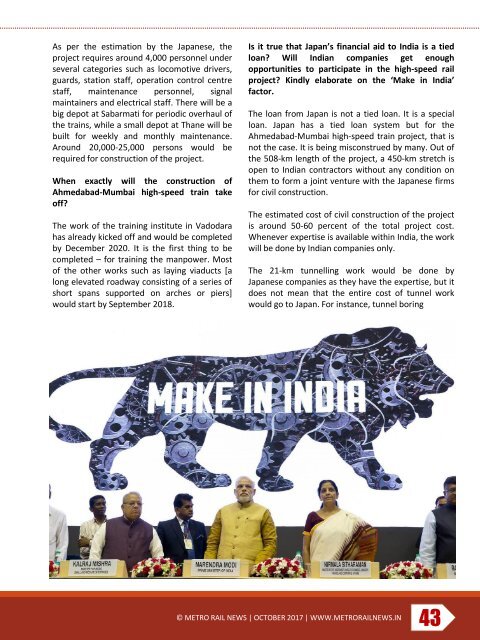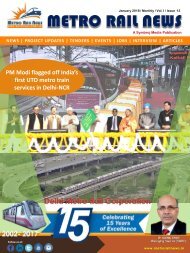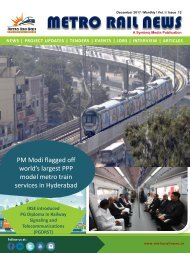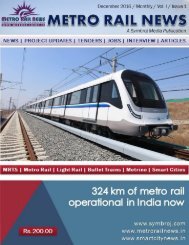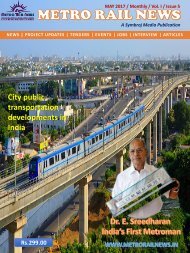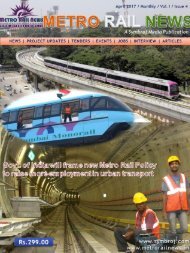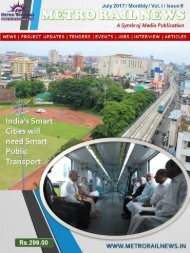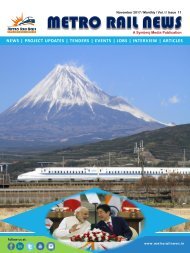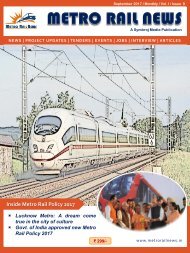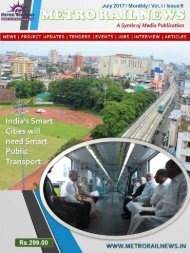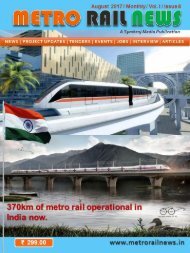Metro Rail News October 2017
October Edition 2017. Owned and published by Symbroj Media Pvt. Ltd., New Delhi, India
October Edition 2017. Owned and published by Symbroj Media Pvt. Ltd., New Delhi, India
You also want an ePaper? Increase the reach of your titles
YUMPU automatically turns print PDFs into web optimized ePapers that Google loves.
As per the estimation by the Japanese, the<br />
project requires around 4,000 personnel under<br />
several categories such as locomotive drivers,<br />
guards, station staff, operation control centre<br />
staff, maintenance personnel, signal<br />
maintainers and electrical staff. There will be a<br />
big depot at Sabarmati for periodic overhaul of<br />
the trains, while a small depot at Thane will be<br />
built for weekly and monthly maintenance.<br />
Around 20,000-25,000 persons would be<br />
required for construction of the project.<br />
When exactly will the construction of<br />
Ahmedabad-Mumbai high-speed train take<br />
off?<br />
The work of the training institute in Vadodara<br />
has already kicked off and would be completed<br />
by December 2020. It is the first thing to be<br />
completed – for training the manpower. Most<br />
of the other works such as laying viaducts [a<br />
long elevated roadway consisting of a series of<br />
short spans supported on arches or piers]<br />
would start by September 2018.<br />
Is it true that Japan’s financial aid to India is a tied<br />
loan? Will Indian companies get enough<br />
opportunities to participate in the high-speed rail<br />
project? Kindly elaborate on the ‘Make in India’<br />
factor.<br />
The loan from Japan is not a tied loan. It is a special<br />
loan. Japan has a tied loan system but for the<br />
Ahmedabad-Mumbai high-speed train project, that is<br />
not the case. It is being misconstrued by many. Out of<br />
the 508-km length of the project, a 450-km stretch is<br />
open to Indian contractors without any condition on<br />
them to form a joint venture with the Japanese firms<br />
for civil construction.<br />
The estimated cost of civil construction of the project<br />
is around 50-60 percent of the total project cost.<br />
Whenever expertise is available within India, the work<br />
will be done by Indian companies only.<br />
The 21-km tunnelling work would be done by<br />
Japanese companies as they have the expertise, but it<br />
does not mean that the entire cost of tunnel work<br />
would go to Japan. For instance, tunnel boring<br />
© METRO RAIL NEWS | OCTOBER <strong>2017</strong> | WWW.METRORAILNEWS.IN<br />
43


